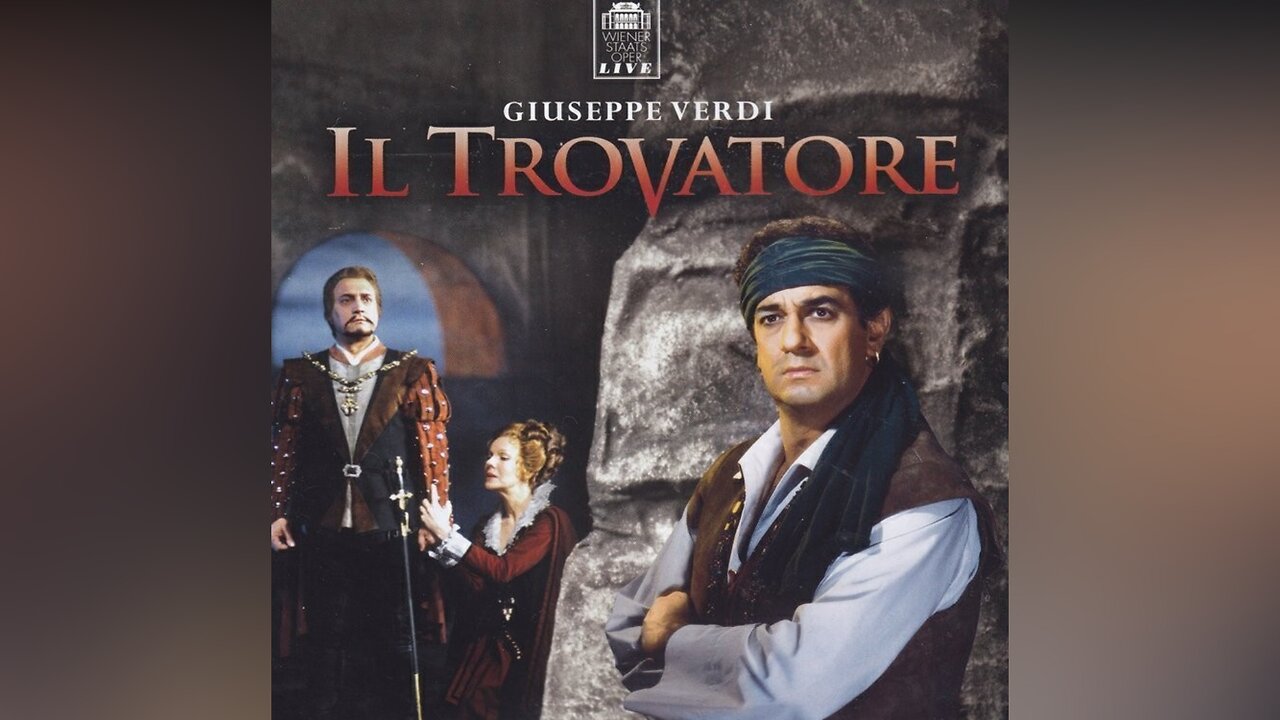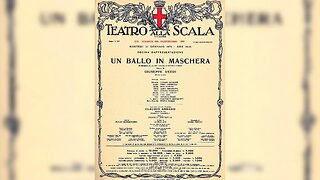Premium Only Content

Il Trovatore: Act I-II | Karajan, Cappuccilli, Domingo, Kabaivanska, Cossotto (Wiener Staatsoper 1978)
Composer: Giuseppe Verdi
Librettist: Salvatore Cammarano, Leone Emanuele Bardare
Premiere: 19 January 1853, Rome (Teatro Apollo)
Language: Italian
Libretto: https://www.opera-arias.com/verdi/il-trovatore/libretto/
Subtitles: English & Italian (Click on CC for subtitles)
Live from Vienna State Opera, 1978.
Conductor & Stage Director: Herber von Karajan
Chorus and Orchestra of the Vienna State Opera
Cast & Characters:
Piero Cappuccilli: Il Conte di Luna
Raina Kabaivanska: Leonora
Fiorenza Cossotto: Azucena
Placido Domingo: Manrico
Josè van Dam: Ferrando
Maria Venuti: Ines
Heinz Zednik: Ruiz
Karl Caslavsky: Un vecchio zingaro
Ewald Aichberger: Un messo
Il trovatore (The Troubadour) is an opera in four acts by Giuseppe Verdi to an Italian libretto by Salvadore Cammarano, based on the play El Trovador (1836) by Antonio García Gutiérrez. It was García Gutiérrez's most successful play, one which Verdi scholar Julian Budden describes as "a high flown, sprawling melodrama flamboyantly defiant of the Aristotelian unities, packed with all manner of fantastic and bizarre incident."
Cammarano died in mid-1852 before completing the libretto. This gave the composer the opportunity to propose significant revisions, which were accomplished under his direction by the young librettist Leone Emanuele Bardare, and they are seen largely in the expansion of the role of Leonora. The opera was first performed at the Teatro Apollo, Rome, on 19 January 1853 where it "began a victorious march throughout the operatic world". Today it is given very frequently and is a staple of the standard operatic repertoire.
SYNOPSIS:
Place: Biscay and Aragon (Spain)
Time: 15th Century.
ACT I - THE DUEL
Scene 1: Aragon: a hall in the palace of Aliaferia, in Saragossa
The followers of the Count di Luna keep watch as he makes his nightly vigil under the windows of Leonora, one of the queen's ladies in waiting, whom he loves.
Ferrando, the captain of the guard, keeps his men awake by narrating a terrible happening of 15 years ago: an old woman, accused of casting the evil eye over the count's brother, was burnt at the stake. The subsequent disappearance of the boy, followed by the discovery of a child's skeleton in the ashes, led to the conclusion that the woman's daughter, who was present at the burning, had thrown him into the flames to avenge her mother. She was never found, but Ferrando swears that he would recognise her. As he relates how the witch has continued to haunt the castle, the soldiers are seized with superstitious terror.
Scene 2: The palace gardens
Leonora loves not the count, but the troubador Manrico. As she waits for him she tells her companion Ines how she first saw him at a tourney and loved him. She rejects Ines' warning of the dangers of her infatuation with the stranger. They retire and the count appears, his love-lorn musings interrupted by the sounds of Manrico's lute and serenade. In the dark Leonora mistakenly embraces the count, Manrico reproaches her and she explains the error. The count confronts Manrico, not only as his rival, but as a follower of the rebellious Count of Urgel; and they rush off to fight a duel.
ACT II - THE GIPSY
Scene 1: A gipsy encampment in Biscay
As the gipsies sing and work at their anvils, Azucena broods on the fate of her mother, burned as a witch.
She explains the circumstances to Manrico (who had left her at an early age to pursue his ambitions and was thus ignorant of the story), going on to tell him how she had intended to avenge her mother by burning the count's son, but had become confused and killed her own child instead. In answer to Manrico's puzzled question about his identity, she assures him that he is indeed her own son - the horrible memory caused her mind to wander and she did not know what she was saying. She reminds him that she has always loved him and has just nursed him back to health after he was wounded in a battle against the count's forces. The battle had taken place just after the duel in which Manrico had spared the count's life, as a voice from heaven seemed to command him. Azucena urges him to strike without hesitation if the occasion arises again.
A message is brought that Leonora, believing Manrico dead, is about to enter a convent. Brushing aside Azucena's pleas that he is too weak to travel, he rushes off to prevent Leonora from taking the veil.
Scene 2: Outside the convent
The count has come to abduct Leonora, but Manrico's followers defeat his and rescue her.
-
 2:50:06
2:50:06
Adaneth - Arts & Literature
1 month agoVerdi: Un Ballo in Maschera | Pavarotti, Cappuccilli-Abbado, Zeffirelli (La Scala 1978-ENG&ITA SUB)
92 -
 56:48
56:48
The HotSeat
14 hours agoI'm NOT Sorry! Guns Aren’t the Problem—Godless Culture Is
37.2K30 -
 9:43
9:43
The Pascal Show
16 hours ago $0.95 earnedWHOA! Annunciation School Sh**ter Identified... Heartbreaking & Insane
8.82K2 -
 22:42
22:42
Liberty Hangout
10 hours agoCollege Democrats Say Gangs Are GOOD!
82.6K72 -
 2:14:50
2:14:50
Badlands Media
15 hours agoBadlands Media Fantasy Football Live Draft
49.4K1 -
 2:12:29
2:12:29
Inverted World Live
9 hours agoWe Are Time Travelers | Ep. 100
91K13 -
 2:57:09
2:57:09
TimcastIRL
9 hours agoCorporate Press Refuses To Mention Minneapolis Shooter Was Trans | Timcast IRL
200K113 -
 5:26:57
5:26:57
Akademiks
9 hours agoWar in RAT-LANTA. Young Thug vs Gunna vs Ralo vs YSL MONDO. Who Will Le Bebe Pick. FINAL CRASHOUT!
63.7K6 -
 1:02:24
1:02:24
Man in America
12 hours agoThe Final Battle: Nanotech, Transhumanism & the War for Your Soul w/ Dr. Ed Group
51.9K7 -
 39:56
39:56
Sarah Westall
7 hours agoUpcoming World Wide Economic Collapse/Deep Recession & What the Big Money is Doing w/ Ed Dowd
49.5K5